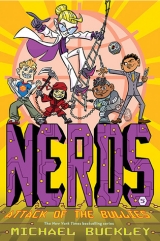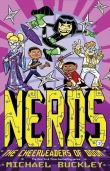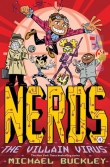
Текст книги "Attack of the BULLIES"
Автор книги: Michael Buckley
Жанры:
Прочие детективы
,сообщить о нарушении
Текущая страница: 8 (всего у книги 14 страниц)

“This is the backup facility for an international spy organization?” Ruby asked, staring up at the sign for Marty Mozzarella’s restaurant. The brightly colored logo was a big, grinning mouse wearing a Rastafarian hat.
“It is,” the principal said.
Ruby was speechless. Marty Mozzarella’s was a restaurant for little kids. The food was a crime against humanity: The pizza tasted like an old man’s slipper dipped in ketchup, the french fries were as soggy as a rag at a car wash, and the chicken fingers might well have been made from the fingers of an actual chicken. Plus, next to the tables, there were fifty decibel-busting video games that shook the air with blinks, bonks, beeps, and blasts.
“My dad brought me here for pizza and games once when I was little. It was fun until he found a dirty diaper in the ball pit,” Duncan said. “I haven’t been back since.”
Matilda gagged.
“Note to self: Do not eat in this restaurant,” Jackson said.
Flinch shrugged. “Speak for yourself. This place has the best food ever.”
Heathcliff didn’t care where they were headquartered. On the ride from the Playground he had switched back and forth from tears to bitterness. Ruby understood why he was so mad, but she had bigger problems on her hands than wiping tears off the face of former agent Choppers. Aside from having to run for her life from the president of the United States and being exposed as a spy, she had disappeared from her parents’ house, after shouting that she hated all her relatives. They must have discovered she was missing by now. Her whole family would be in a panic.
Once inside the dingy restaurant, Ruby’s allergies went haywire. Her lips swelled up, her fingers got puffy, and her ears ached. Her eyes watered like faucets and her swelling ankles threatened to split her sneakers. One look around explained why. She was in a restaurant filled with a mob of sticky-faced pre-kindergartners who wiped their runny noses on their hands and then wiped their hands on anything that didn’t move. But it was the actual employees that made her suffer the most. She was allergic to minimum-wage, dead-end jobs and hopelessness. She reached into her pocket for an allergy tablet and swallowed it dry.
Most of the team squeezed into a booth with the principal while Flinch, mesmerized by the lights and sounds, decided to have a look around.
“So, as you can tell, we’ve got a few problems,” the principal said, trying to shout over a robotic Marty and his vermin friends singing the Happy Birthday song to a screaming kid.
“What about our parents?” Jackson asked.
“Yeah, they’re going to be worried when we don’t come home,” Matilda said.
“And what are we going to do to protect them? I’m sure the Secret Service will want to question them. What if they’re taken into custody to try to force us out?” Duncan asked.
“Most of your parents are aware of your secret lives. I contacted everyone’s except for Heathcliff’s and Ruby’s.”
Heathcliff groaned, then got up and stomped off.
“I should go see them,” Ruby said.
“I think that is a terrible idea,” the principal said. “Going home will put them in danger. The Secret Service will be watching your house, and the second you show up they’ll have you. Right now, the best thing you can do is let your parents believe you ran away.”
Ruby was shocked by his idea. “You want to make them worry?”
“Your parents will call the cops and report you missing and the police will show up and do an investigation. With police in the house, the Secret Service and the CIA might keep their distance. All those cops and all those family members might buy us a little time until we can finish this mission. Ruby, I know you hate this idea, but it’s the best one we’ve got right now.”
A teenager in a mouse costume approached their booth.
“Excuse me, but is he with you?” he asked, pointing toward a candy machine. Inside were mounds of chocolates and sweets with a large mechanical claw above them. Flinch had his arm trapped inside the dispenser, yet he was singing with joy. “He’s scaring the other kids.”
“Oh, but the six-foot rat bringing them food isn’t freaking them out?” Jackson asked.
“Hey, don’t say ‘rat’ in here. I’m a mouse! Do you want the health department coming down on us?”
Duncan stood up. “I’ll go get him.”
“Thank you,” the mouse said as he rushed off to take an order.
Jackson’s braces whirred nervously. “Is this place safe? If they find us, it’s only a matter of time before we’re lab rats.”
“Hey, kid!” the man in the mouse suit shouted from across the room. “Shut it!”
“Sorry,” Jackson said sheepishly.
The principal shook his head. “This restaurant is completely off the grid,” he said. “Only myself, Agent Brand, and a few former directors even know it exists. Best of all, soon it will be completely operational. We’ll have the full science team here before long.”
Ruby looked around the restaurant. She hadn’t noticed at first, but most of the cooks were scientists from the Playground. Now, instead of lab coats, they were wearing T-shirts with MARTY MOZZARELLA on the front and sliding trays of garlic knots into the ovens.
Duncan returned with Flinch, who was carrying a droopy slice of pepperoni and mushroom. “This place rules!”
Ruby turned to the principal. “What are we supposed to do in this dump?”
“This ‘dump’ is filled with massive computing power,” the principal said. He squeezed out of the booth, crossed the room, and pressed his hand on a game’s screen. A green light scanned his fingertips and then the game disappeared, replaced by an array of surveillance camera images from all over the world. “Every one of these arcade games has a hard drive with processor speeds far beyond anything we had at the Playground. The kitchen is stocked with the latest weaponry. There are surface-to-air missiles inside that robot squirrel over there.”
“So what’s the plan?” Matilda asked.
“The same as it was yesterday: Find Tessa Lipton. Only this time we’re not rescuing her. We’re bringing her to justice.”
“One suggestion!” Flinch cried, his mouth full of pizza. “Can we make this place our permanent headquarters? It’s amazing and the food is yum!”

“That looks like a Sit ’n Spin,” Funk snarled.
Tessa had to agree. Miss Information’s time machine appeared to be a very large version of a toy that caused her to throw up all over herself when she was four years old. Oh, what a delightful present that was, she thought. Hours of gut-wrenching fun!
“Are you sure you didn’t just swipe that from a playground?” Snot Rocket asked.
“We tried several designs, but this one promised to be the safest for the passengers,” the tired scientist replied. Tessa had learned her name was Dr. Rajkumar and that she was an expert on temporal physics—whatever that was.
“Why does it need to be safe?” Tammy screamed.
“Because it rips a hole in the fabric of time and space,” Dr. Rajkumar said. “To create the anomaly necessary for time travel, the machine has to generate power on the levels comparable to a supernova and—”
“Blah, blah, blah, science!” interrupted Miss Information. “So … how do we use it?”
“The passenger enters the precise date, time, longitude, and latitude into the control pad, then turns the wheel. A wormhole will open and everyone on board will be pulled through it. When your mission is complete, just press the HOME button and it will bring you back here.”
“Easy breezy,” Miss Information said.
“But at great personal risk to my health and well-being, I have to insist that you not do this,” Dr. Rajkumar said.
“PREPARE THE TIGERS!” Miss Information yelled.
“Please, I beg you. What you want to do could have very nasty side effects. If you go into the past and change something, there is no way of predicting the ripple effect it will have on the present. Let’s say you cause an accident that kills someone—hypothetically, say the grandfather of Alexander Fleming—”
“Who?” Tessa asked.
“The man who discovered penicillin. What if you accidently killed his grandfather? Hundreds of thousands—maybe even millions—of people would be dead because he never invented the vaccine.”
“Attention, kids, do not kill Alexander Fleming … OK—anything else?”
“Yes! Changes aren’t always so straightforward. Any little thing could change the course of human history. The simplest action could literally destroy the world—stepping on an ant, causing a traffic accident, stealing someone’s parking spot—all of these things could be tied to much bigger, much more important events. Cutting someone off in traffic could literally be tied to the birth of another human being. There’s just no way of knowing.”
“Consider us warned,” Miss Information said. “Now, let’s give my new toy a spin. Benjy, have you compiled that list I asked you for?”
“I have,” the robot said as it zipped into the room. “On August 16, 1987, Edgar Escala—Julio Escala’s grandfather—visited Washington, D.C., on vacation from Mexico City and made a stop at an immigration office to get information on becoming a United States citizen. Public records show that Edgar signed in at the visitors’ center at 8:05 A.M. on the date in question. There is a ninety-seven percent chance that this experience directly lead to Mr. Escala moving his family to the United States.”
“Well, we’re going to have to find a way to change his mind,” Miss Information said as she stepped onto the time machine’s platform.
“I’m downloading the information, time, and coordinates into your machine as well as all the information I collected about the other NERDS and their families,” Benjy chirped.
Dr. Rajkumar blanched. “This is your plan? Making sure those kids were never born?”
“You got it! Kids, let’s go,” Miss Information said, dismissing the scientist and ushering Tessa and the others onto the Sit ’n Spin platform. Tessa didn’t like the idea of erasing someone, but she couldn’t leave her father in jail. She and the others turned the big wheel at the center of the machine, and it started to spin.
“I don’t feel so good,” Snot Rocket said as the wheel spun faster and faster.
“Yeah, I’m not sure about this,” Tammy cried as the air grew very cold and crackled with electricity.
Tessa felt very nauseous herself, and it wasn’t just from the spinning. The machine was making her insides feel like a bottle of soda shaken by a mischievous child. She was sure she was going to pop.
“I want to get off,” Funk whined. “We have to stop this!”
But Miss Information ignored his plea and the wheel turned even faster. The underground lair vanished and a series of images of people and places appeared: a woman slapped a man in a nightclub, a teenager danced at a rock concert, a little boy played kickball, a dog pulled his owner down the street, a soldier hurried across a war-torn lanscape, a man and a woman got married with a little white dog at their feet. They seemed to come from all different time periods. Could the rest of the team see them, too?
And then Tessa saw her father creeping into her bedroom at the White House, sitting down next to her, and watching her sleep.

“Dad?”
There was a final flash and he vanished along with the other visions, and Tessa was startled to find that she and her team were no longer in Miss Information’s secret lair. Somehow they were in the middle of a busy Washington, D.C., street, and there was a bus barreling right at them.

TOP SECRET DOSSIER
CODE NAME: PIZZA FACE
REAL NAME: DENISE BERNAKE
YEARS ACTIVE: 1984–88
CURRENT OCCUPATION: ROCKET SCIENTIST
HISTORY: DENISE WAS ONE OF
THOSE POOR CHILDREN WHO SUFFER
FROM EARLY-ONSET PUBERTY. ONE
DAY SHE WAS A SMILING, SWEET
LITTLE GIRL AND THE NEXT SHE
HAD A FACE FULL OF ZITS. NO
AMOUNT OF ACNE MEDICINE SEEMED
TO HAVE ANY EFFECT, BUT HER SAD
AFFLICTION WAS TURNED INTO A
TREMENDOUS ASSET WITH THE HELP
OF MODERN TECHNOLOGY.
UPGRADE: USE YOUR IMAGINATION,
KID. WHAT COULD A GIRL WITH A
FACE FULL OF ERUPTING PIMPLES
DO? JUST THINKING ABOUT WRITING
IT DOWN MAKES ME GAG.


Heathcliff needed to take his mind off his parents and his heartbreak, so he decided to turn his attention to the other dilemma—namely, filling in the holes of his Swiss cheese memory. He was convinced that Benjamin was the key to unlocking the mystery, so he worked with a feverish passion, replacing each tiny chip and wire while the rest of the team had one of their stupid secret meetings in a booth at Marty Mozzarella’s.
He sat in a dark corner of the restaurant and tested circuits and installed a new cooling system. Then he worked on Benjamin’s gyroscopic flight simulator, which gave the robot its ability to fly. Finally, he snapped the ball shut. There were still functions to reconnect and tests to administer, but surely none of them were vital to Benjamin’s operation. He pushed the button on the side of the orb and listened as it hummed to life. A bright red light glowed inside, a signal that there was a serious internal error, but then the light changed to Benjamin’s familiar blue, followed by some loud clicking and beeping and then finally …
“Heathcliff?”
“Benjamin! Boy, am I glad to hear your voice. You were damaged, but I repaired you, and I’ve got a million questions.”
“Ms. Holiday is—”
Benjamin’s blue light turned red and there was a loud POP! Black smoke seeped through the casing, and the ball fell to the floor.
Heathcliff cried out. How could he have been so stupid? His eagerness to know the truth had gotten the best of him, and now he’d probably made Benjamin worse. He picked up the robot and gingerly opened the cover. Much of the circuitry he had installed was melted.
“Any luck?” Jackson asked. The boy stood a few feet away, watching Heathcliff curiously.
Heathcliff grunted. He might have been lonely, but he wasn’t about to get chummy with his archenemy. A million atomic wedgies flashed in his memory.
“That’s great. We could use Benjamin’s help. And we could use yours, too,” Jackson said.
Heathcliff wanted to tell him to jump off a bridge. He wanted to laugh in his face. He wanted to spit at him. How dare Jackson come to him for help when he and the others shunned him every day? Oh, the indignity! He felt the rage coursing through every vein, and in that anger was something familiar, something comfortable—like a pair of fluffy socks or his stuffed penguin. That anger would protect him from heartbreak and humiliation.
“Unless you still need a little time on your own,” Jackson said.
Heathcliff blinked. “You think I want to be alone?”
Jackson shrugged. “To be honest, I wasn’t sure how you felt. I know how I would feel if my dad didn’t remember me and the only thing that would fix him was buried in cement. I’d want to be alone for a while. And then I’d want a friend.”
“You want to be my friend?” Heathcliff asked.
Jackson nodded. “When you’re ready. I know I have a lot to make up for.”
Heathcliff felt the anger drain out of him like water in a spaghetti strainer. He wasn’t ready to throw his arms around Jackson and forgive him, but his armor of hate felt claustrophobic.
“Listen, I know you’re bummed about that formula, but the scientist who was working on it wasn’t buried in the Playground. He’s here somewhere, probably making breadsticks or cleaning the grease traps. He can start over. That’s the cool thing about life. If you want, you can start all over. So, can you give us a hand or should I call you a whaa-mbulance?”
Heathcliff smiled. “Lead the way.”
It was late, and the restaurant was closed. The team members were busy working on the various arcade games scattered about the room. Flinch was completely hypnotized by a game called Dig Dug, while Matilda was at a game called Donkey Kong.
“Glad you could join us,” the principal told Heathcliff as he stuffed a fistful of gold tokens into his hand.
Heathcliff found a console called Joust that appeared to be a nonsensical game where knights rode flying ostriches over a river of lava. He sank a coin into the slot and a green light appeared on the screen. Instinctively, he placed his hand on it.
The game vanished, replaced by a list of the computer’s applications. He scanned the list line by line. The game had the most advanced Web-browsing program he had ever seen. He could read through classified materials from the CIA, the FBI, the IRS, and something called Project Blue Book. He could use facial recognition technology, every satellite circling the world, the Hubble Space Telescope, and the onboard computers of the International Space Station. The list went on and on, and for the first time since he had awakened without his memories he felt like a spy—a real spy!
“What’s our priority?” Heathcliff asked.
“We have to find Miss Information,” Ruby said. “She’s within a hundred miles of the White House.”
“How do you know that?”
“I did some calculations on that flying bus of hers. A machine that size and shape could only hold so much fuel. They could get about five hundred miles out of it, assuming it flies as fast as a passenger plane.”
“They flew west, too. I’ve been searching satellites for an appropriate landing site,” Duncan said.
“There’s an easier way to track them,” Heathcliff said. He called them over to his game, where he’d accessed a government weather-tracking site. “We can track their exhaust. The fumes left behind will stay in the air for at least a day afterward.”
He showed them a satellite image of Washington, D.C., at the time of the attack, then ran it through a pollution filter until a green band crossed from one side of the screen to the other.
“Like a trail of bread crumbs,” he said. “We need a higher-res picture, but once I get that, this will tell us exactly where the ship went.”
The principal nodded. “That’s good work, Hodges. Keep us in the loop.”
Heathcliff’s proud grin felt like it was stretching his face so wide it might not return to normal.
“If you find her, we can go home,” Duncan said.
“Who wants to go home?” Flinch cried while munching on cold pizza.
“I’ll automate the search. If we’re lucky, we might have an address by tomorrow morning,” Heathcliff said. “What else can I do?”
The principal smiled. “You can help Ruby with surveillance. Miss Information and Tessa must have been captured on video somewhere. It might help us narrow down their location faster.”
“And what are you going to do, boss?” Matilda said.
“I’m going to make some calls. You and your families are going to need new identities. I have friends in the FBI who will do me some favors.”
Heathcliff took a chair and sat next to Ruby, who was busy on a Ms. Pac-Man machine. “Thanks,” he said.
Ruby cringed. “For?”
“Letting me help. Most of the time you guys won’t even look at me. Nice to know I’m not invisible.”
“You’re not invisible,” Ruby said.
“Are you OK? You look worried.”
“I’ve decided not to tell my parents where I am. It’s going to hurt them a lot, but it’s going to keep them safe, too. I feel terrible,” she said as she flipped through several screens of footage.
“I’m sorry,” Heathcliff said. “Families are important, and it’s hard when you can’t protect them. Especially from something you’re responsible for.”
Ruby looked at him suspiciously. “Jackson told you what you did?”
He shook his head. “No, but I know it was something bad.”
He silently prayed that she would deny it, but she didn’t. Instead, she turned her attention back to the screen.
“Are you monitoring wiretaps, too—you know, cell phone chatter?”
“Yes, and I haven’t heard a peep,” she said. “But I suspect Ms. Holiday’s too smart to use a phone.”
“You’re probably right,” Heathcliff said. There were so many cameras to monitor. It was like trying to find a specific seashell on a beach. “I can make an adjustment that will make all of this much easier.”
Ruby stepped back and let him work. Heathcliff pushed buttons so furiously the game rattled. Being a part of the team again gave him a joy and excitement that made him feel like a pot boiling over with water. When he was finished, the screen had three images on it: Ms. Holiday, with and without the mask, and Tessa Lipton.
“This surveillance program has facial recognition, but it’s sort of lame.”
“It’s state-of-the-art,” Ruby objected.
“I’d hardly call what it does ‘art.’ It takes six facial features and tries to pinpoint them from grainy video. I’m stunned it ever works. I increased its parameters and now it’s searching for one hundred fifteen thousand different elements, as well as vocal cues. I’m accessing Ms. Holiday’s employee files so we can add in her favorite foods, authors, television shows, actors, whatever. We can link these things to the search and cross-reference receipts from every purchase in the world. Getting more detailed actually makes it simpler. Tessa Lipton is even easier. She’s famous. Sooner or later they are going to be seen. They’re girls.”
“So?”
“Girls like to shop.”
“That’s sort of offensive,” Ruby grumbled. “And not true! Not every girl in the world likes to shop.”
“Not every girl. But those two? Absolutely. Ms. Holiday never wore a cardigan twice, and from what I’ve read, Tessa has a thing for high-end fashion,” Heathcliff said.
“You’ve read that Tessa Lipton likes fashion? Where?”
“In People magazine.”
“When do you read People magazine?”
“I’ve been locked up without much to do for three months. I’d read Ladies’ Home Journal if you gave me a copy. There are a few other things we can add to the search, too,” Heathcliff continued as he jammed the joystick back and forth. “Why just video? We can add newspapers, magazines, and social media sites. Our targets could appear in the background of someone else’s photos and this ‘state-of-the-art’ program wouldn’t catch it.”
“I think you’re going a bit overboard,” Ruby said, nudging the boy aside. He could tell he was making her uncomfortable. She still didn’t trust him.
Suddenly, there was an alert and an image appeared on the screen.
“We’ve got a hit!” Ruby said.
It was a black-and-white newspaper photograph of a car crash on a street across town. In the background, they could see Ms. Holiday in her mask, along with Tessa and the rest of the kids who had attacked them the day before.
“They caused some kind of accident,” Heathcliff said. “But wait—this can’t be right. This newspaper article is decades old.”
Ruby glanced at the newspaper’s masthead. It was published August 16, 1987—more than twenty-five years ago.
“I don’t understand. The hard drive should have no problems with this,” Heathcliff said defensively.
“Well, whatever you did is making it screwy,” Ruby said. “Is this one of your schemes?”
“Schemes?” Heathcliff said.
Ruby eyed him closely. “Never mind,” she said as she jumped up from her chair. “I need something to eat.”
Heathcliff’s heart sank. So much for being a member of the team.








